Choosing the right approach in software development is pivotal to the success of any project. Choosing between onshore vs offshore software development can be daunting, but the decision is critical. As businesses and startups strive for efficiency and cost-effectiveness, finding the most suitable development approach becomes essential.
Aloa understands the complexities of onshore and offshore development. With a global talent pool of expert software developers, Aloa helps businesses and startups navigate these challenges, offering tailored solutions that align with their specific project needs. Whether it's about time zone differences, effective communication, or quality assurance, Aloa has the expertise to guide you.
This blog will delve into the key differences between onshore vs offshore software development. You will clearly understand which option best suits your project, whether onshore, offshore, or a combination. Making an informed decision is vital, as it can significantly impact project timelines, quality, and costs.
Aloa is here to assist you in making the best choice for your software development journey. Let's dive in!
Overview of Onshore vs Offshore Software Development
In the global IT outsourcing market, the choice between onshore vs offshore software development has become critical for businesses seeking to stay competitive and cost-effective in today's tech-driven world. To make an informed choice, it's imperative to understand the key differences and advantages of these approaches.

The global IT services outsourcing market, worth USD 520.74 billion in 2019, is projected to experience a steady growth trajectory, boasting a compound annual growth rate (CAGR) of 7.7% from 2020 through 2027.
This industry's development is underpinned by the substantial demand for IT operations, enabling businesses to concentrate on their core functions and achieve operational cost reductions. There is an increasing necessity for expertise in devising and optimizing IT strategy, providing enterprise architecture advisory services, offering portfolio consulting, and ensuring efficient and seamless digital transformation.

The market has been categorized into on-shore and off-shore segments based on geographic location. 2019, the off-shore sector claimed a more considerable revenue and is poised for significant growth between 2020 and 2027. Offshoring IT operations to emerging economies for cost advantages, currency risk mitigation, and offset obligation fulfillment has historically propelled the off-shore sector.
However, a shift towards onshoring is anticipated in the coming years due to its ability to address issues like quality, communication gaps, and security risks associated with offshore outsourcing. Onshoring, aligned to the same time zone and legal jurisdiction, facilitates streamlined communication, enhancing service efficiency. As a result, the on-shore segment is projected to experience the highest CAGR from 2020 to 2027.
What Is Onshore Software Development
Onshore software development refers to developing software within the same geographic region or country where your business is located. It offers several advantages, including proximity and ease of communication with the development team. Cultural compatibility can also be crucial, reducing the risk of misunderstandings and fostering a collaborative atmosphere.
For instance, onshore development has seen substantial growth in the United States. This local approach provides a foundation for project success and helps navigate legal and intellectual property considerations. Onshore software development remains viable for businesses prioritizing close collaboration and minimizing language barriers.
Advantages of Onshore Software Development
When it comes to software development, onshore development, often referred to as domestic software development, offers several distinct advantages. These advantages make it a viable choice for various businesses. Let's delve into five key benefits of onshore software development:
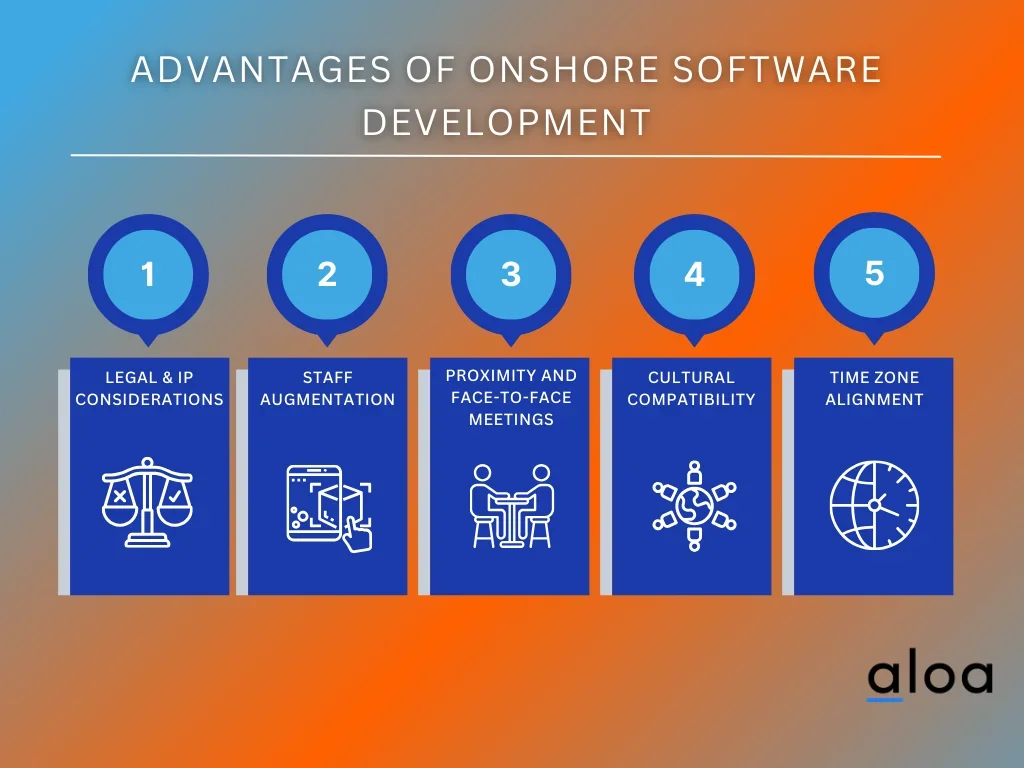
Legal and Intellectual Property Considerations
Onshore developers typically operate under the same legal framework as your business. This shared legal environment can simplify the protection of intellectual property, data security, and contract enforcement. It can also offer a higher level of assurance regarding the security and confidentiality of your project.
Staff Augmentation
Onshore development allows you to easily augment your in-house team with skilled onshore developers. This flexibility is invaluable when working on projects with varying resource requirements. You can quickly scale up or down to meet your project's demands without the complexities associated with offshore or remote team management.
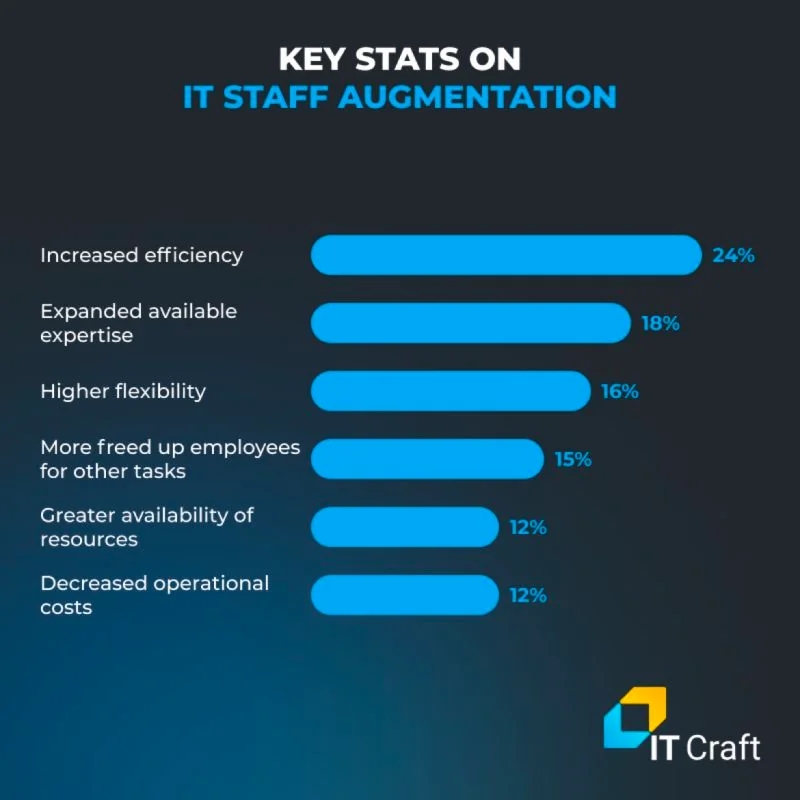
Staff augmentation in software development significantly impacts efficiency and flexibility. It allows companies to quickly scale up or down as needed, adapt to changing project requirements, and access specialized skills, enhancing the overall development process.
Proximity and Face-to-Face Meetings
Onshore software development provides the advantage of physical proximity. When your software development team is located in the same country or region, it's easier to have face-to-face meetings. This proximity fosters direct communication, ensuring project requirements and goals are well-understood. Face-to-face interactions can lead to quicker issue resolution and a stronger client-developer relationship.
Cultural Compatibility
Cultural differences sometimes pose challenges in software development projects. Onshore development reduces these challenges, as the team will likely share a common culture and native language. This shared cultural understanding can lead to better collaboration, less miscommunication, and a more harmonious working relationship.
Time Zone Alignment
Onshore development often aligns with your business hours and time zone, minimizing time differences. This synchronicity allows for real-time communication and immediate response to project needs. No more waiting for team members on the other side of the world to wake up or deal with significant time gaps that can slow down project progress.
Disadvantages of Onshore Software Development
Onshore software development undoubtedly offers several benefits, but it's essential to acknowledge its downsides. To provide a balanced comparison, we will delve into five significant disadvantages of onshore software development.
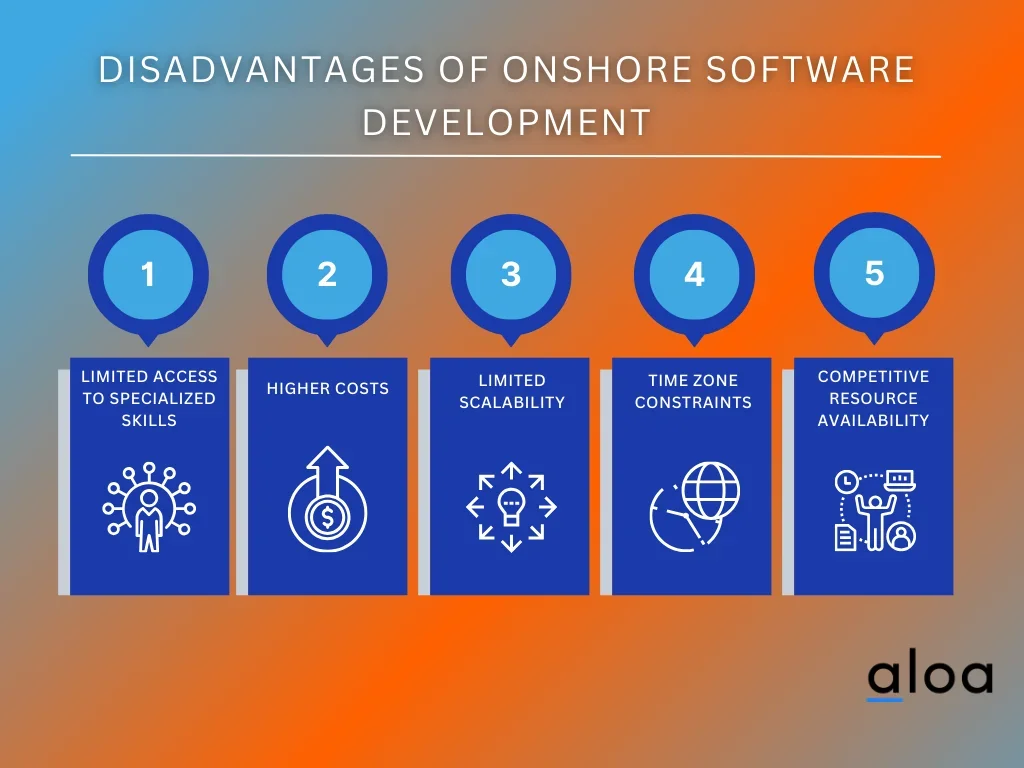
Limited Access to Specialized Skills
While onshore teams excel in many areas, they may need more specialized skills that could be readily available offshore. Finding developers with niche expertise might be challenging, forcing companies to compromise on project requirements.
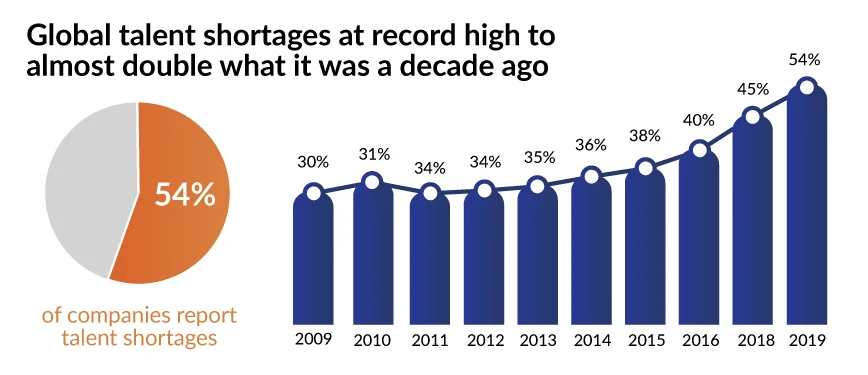
As per a recent study conducted by Manpower Group, in 2023, 4 out of every five employers across the globe face challenges when locating qualified personnel. Notably, Germany is positioned at the second spot with an 86% shortage, following Taiwan, which tops the list with a 90% shortfall.
The scarcity of skilled workers is 78% in the IT sector, mirroring the situation in other industries. Consequently, 55% of employers are open to recruiting talent from foreign countries, particularly within the IT sector.
Higher Costs
Onshore development typically comes with higher labor and operational costs. Developers in countries with a high cost of living demand higher salaries. This can significantly impact the project budget, making it less cost-effective than offshore alternatives.
Limited Scalability
Onshore teams may need help scaling up quickly to meet the needs of rapidly growing projects. Scaling a team up and down on short notice can be a complex and time-consuming process, potentially affecting project timelines.

As indicated in a survey conducted by McKinsey, a remarkable 87% of participants mentioned that as early as 2020, they were already encountering deficiencies in their IT teams, primarily due to obstacles in recruitment, or they foresaw such gaps emerging in the next few years.
Various other credible sources corroborate this observation, emphasizing the escalating severity of the global shortage of IT skills that causes limited scalability.
Time Zone Constraints
Onshore development might not be the most suitable choice if you work with a globally distributed client base or need round-the-clock development. Time zone differences can lead to communication delays and hinder real-time collaboration.
Competitive Resource Availability
In high-demand tech hubs, securing top talent can be fiercely competitive. This can result in longer recruitment times and, in some cases, the need to compromise on the quality of team members due to a limited talent pool.
What Is Offshore Software Development
Offshore software development involves outsourcing your software projects to development teams in different countries or regions. This approach often offers cost savings, access to a global talent pool, and the ability to maintain 24/7 work cycles due to different time zones.
For example, Eastern Europe and South America have become growth markets for offshore software development. Businesses can leverage the global shortage of skilled IT professionals and find the best talent for their projects while potentially reducing costs.

The offshore software development market had a market size of USD 122,257.5 Million in 2021, and it is estimated to attain USD 283,457.5 Million by 2030, demonstrating a compound annual growth rate (CAGR) of 10.13% from 2022 to 2030.
Advantages of Offshore Software Development
Offshore software development has gained significant prominence in recent years, offering businesses myriad benefits that make it a viable option for various projects. This section will delve into five key advantages of offshore software development while emphasizing the target keyword and other relevant terms.
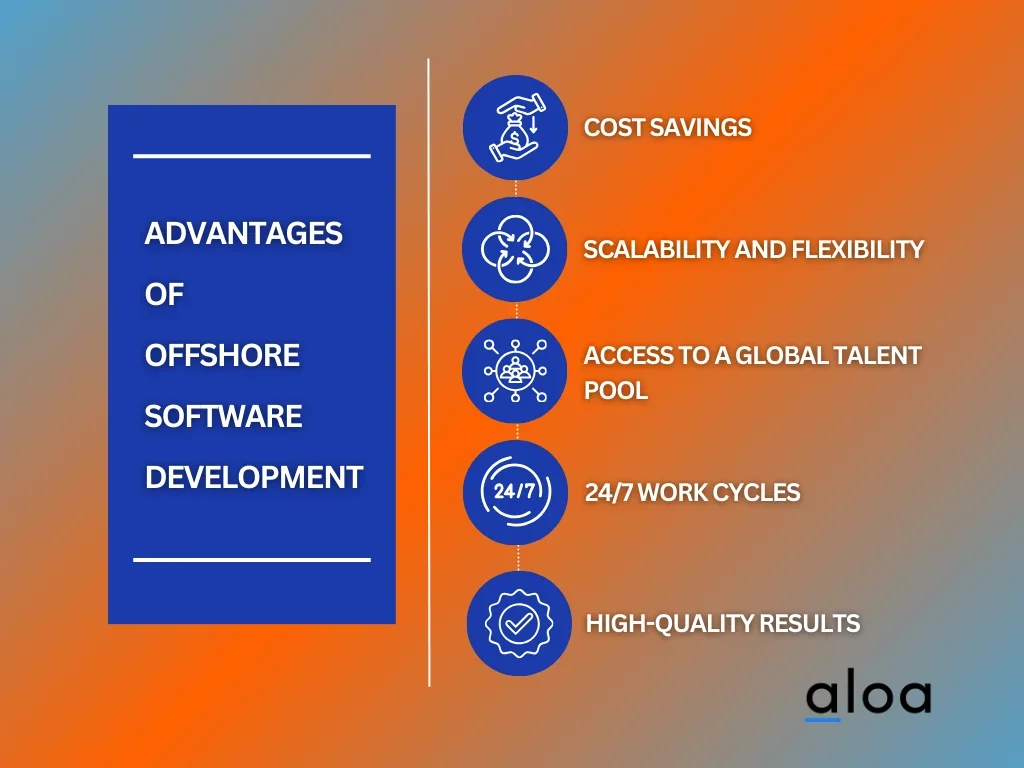
Cost Savings
Offshore software development is often a cost-effective option. With lower labor and operational costs in offshore locations, businesses can achieve substantial savings without compromising quality. This financial advantage allows organizations to allocate resources more efficiently, invest in other areas of their operations, and execute projects that budget limitations may have constrained.

Less economically developed regions have recently emerged as significant contenders in the global IT outsourcing landscape. These areas have established themselves as dependable and highly productive IT centers, contributing substantially to developing mobile and web solutions. With this context in mind, let's embark on our exploration of these regions.
Scalability and Flexibility
Offshore teams are generally more scalable and flexible, making them ideal for projects of varying complexity and size. Whether you need to expand or downsize your development team as the project evolves, offshore developers offer the flexibility to accommodate your needs. It's an ideal solution for businesses with fluctuating project requirements.
Access to a Global Talent Pool
Offshore development expands your access to a diverse and vast talent pool. You can handpick developers and experts with specialized skills tailored to your project's needs, ensuring you have the best minds working on your software. The ability to tap into a wide range of talents can significantly enhance the quality and innovation of your project.

When it comes to outsourcing, India undisputedly holds the top position. No other nation can rival the abundance of highly skilled professionals that India possesses. According to a recent report from Statista, India emerged as the leading global hub for offshore business services in 2021.
The IT sector in India showcases rapidly evolving software and technical capabilities, incorporating disruptive technologies such as data analytics and cloud computing, which are pivotal for opening up new opportunities across various industries. As per the Economic Survey of 2022, IT exports were a driving force behind the remarkable 18.4% growth in India's services exports from April to December.
Here are the compelling factors that establish India as the ultimate destination for outsourcing:
- A vast reservoir of English-speaking, skilled workforce.
- A cost-effective labor pool.
- World-class infrastructure.
- A digital-first, innovation-ready environment.
- Exceptional technology efficiency.
24/7 Work Cycles
Time zone differences can be an asset, often viewed as a potential drawback. Offshore software development enables round-the-clock productivity. While your onshore team rests, your offshore developers can keep the project progressing. This feature can substantially accelerate project delivery and provide rapid responses to issues or changes, thereby enhancing the overall efficiency of the development process.
High-Quality Results
Contrary to the misconception that offshore development equates to lower quality, many software development companies uphold rigorous standards. They often match or surpass the quality achieved by onshore teams. With the right partner and effective project management, offshore development can yield high-quality results that meet international standards and industry best practices. Many offshore developers are proficient in the latest technologies and methodologies, ensuring your project remains competitive globally.
Disadvantages of Offshore Software Development
Offshore software development undoubtedly offers various advantages, but it's equally essential to consider the disadvantages. Let's delve into five critical drawbacks associated with offshore software development, shedding light on the less favorable aspects of this approach.
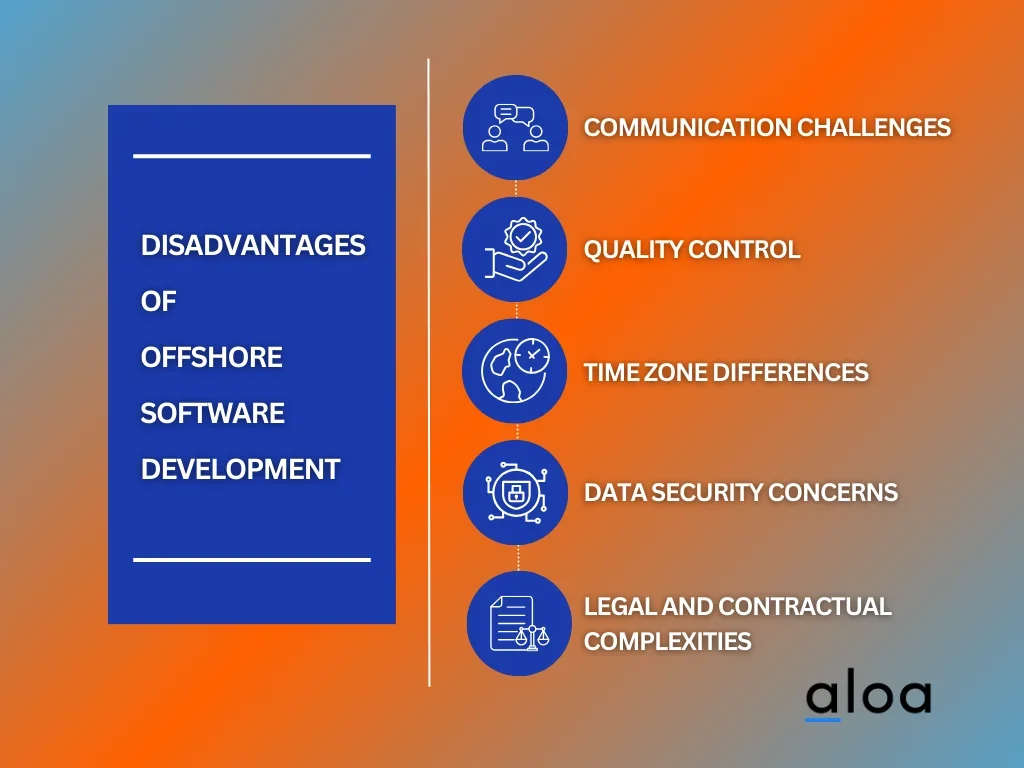
Communication Challenges
Effective communication is the linchpin of successful software development. When your team is scattered across different time zones and regions, the potential for misunderstandings and miscommunication increases. Language barriers, cultural differences, and varying work hours can all contribute to communication challenges, making it harder to convey ideas, address issues, and ensure everyone is on the same page.
Quality Control
Quality assurance is a critical aspect of software development. Maintaining stringent quality control becomes more complex when your development team is offshore. The physical separation can lead to difficulties overseeing and reviewing the work. Ensuring that the code aligns with your project's standards and specifications can be daunting when you need immediate access to the development team.
Time Zone Differences
While time zone differences can sometimes be advantageous for achieving round-the-clock productivity, they can also pose a challenge. Collaborative tasks and real-time discussions become problematic when your offshore team's working hours are separate from yours. Delayed responses and extended feedback loops can hinder development and disrupt project timelines.
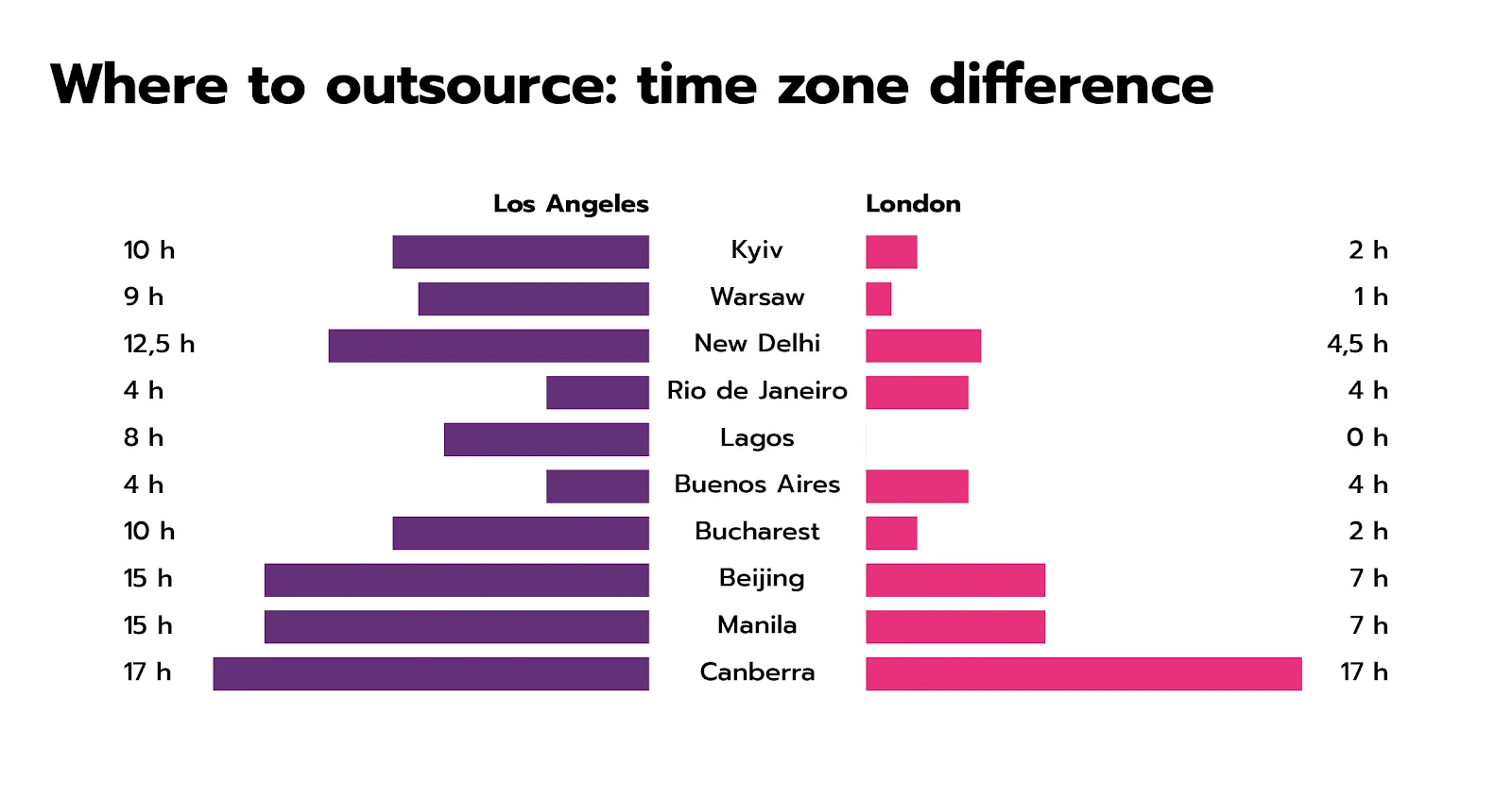
The time difference is often viewed as a drawback during the development process. However, there are instances where it can work to your advantage. Think of the time shift as a valuable asset that lets you review the outcomes of your late-night feedback early the following day. As you rest, your outsourcing collaborator is diligently enhancing your application.
Data Security Concerns
Data security is a paramount concern in today's technology landscape. You might have to share sensitive business information and proprietary code when working with offshore teams. Ensuring the confidentiality and security of your data can be challenging, especially when dealing with companies in regions that may have a different level of data protection regulations or enforcement than your home country.
Legal and Contractual Complexities
Navigating the legal aspects of offshore software development can be intricate. Establishing a solid contractual framework, addressing potential disputes, and ensuring compliance with international and local regulations requires careful consideration. These complexities can lead to legal disputes and contractual issues that may disrupt the project and incur unexpected costs.
Considerations When Choosing Between Onshore Vs Offshore Software Development
When deciding between onshore and offshore software development, weighing several considerations to make an informed choice is crucial. Here are five key factors to ponder:
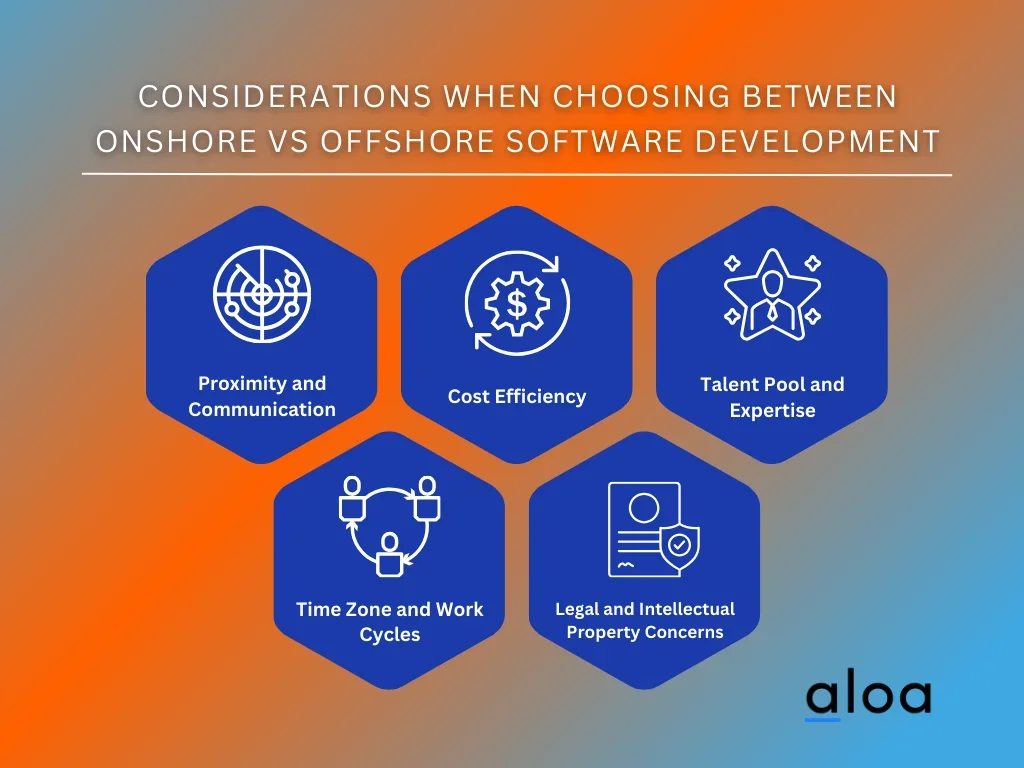
Proximity and Communication
One of the most significant advantages of onshore software development is proximity. Communication is seamless when your development team is in the same geographic region. Real-time collaboration, face-to-face meetings, and overlapping working hours contribute to a smoother development process. Onshore development is often preferred for projects with rapidly changing requirements or frequent client interactions.
Cost Efficiency
Offshore software development can be more cost-effective, making it an attractive option for budget-conscious projects. Offshore teams often come at a lower cost per hour due to differences in labor costs between regions. However, it's essential to consider hourly rates and overall project cost, which factors like project scope, management, and potential communication challenges can influence.
Talent Pool and Expertise
Onshore development offers access to a localized talent pool with knowledge of local markets and culture. This can be advantageous for projects that require domain expertise, understanding of local regulations, or specialized skills. On the other hand, offshore development provides access to a global talent pool, which can be invaluable for projects requiring a diverse skill set, scalability, and 24/7 development cycles.
Time Zone and Work Cycles
Offshore software development can capitalize on the time zone differences for continuous work cycles. While onshore teams might face time zone limitations, offshore teams can work on projects around the clock. This can lead to faster project delivery. However, managing time zone differences effectively is essential to avoid delays and miscommunication.
Legal and Intellectual Property Concerns
Legal and intellectual property (IP) matters are significant in decision-making. Onshore development can offer a more transparent legal environment, reducing the risk of IP disputes. Offshore development requires robust contracts and due diligence to safeguard your intellectual property, which might entail additional legal costs.
Key Takeaway
Onshore vs offshore software development is a critical decision businesses must make to leverage their resources effectively. The choice between these two approaches can significantly impact a project's success. In making this decision, it's essential to consider project requirements, cost, quality, and the influence of agile methodologies. A well-informed choice aligned with your needs is vital to successful software development.
Evaluating which approach aligns best with project requirements is essential, as project types and suitability can vary. If you find yourself at a crossroads, trying to decide which route to take, Aloa is here to guide you. Whether it's the proximity and compatibility of onshore development or the cost-effectiveness and access to global talent in offshore development, we're equipped to assist you in navigating this crucial decision.
Reach out to Aloa for the expert insights and support that can lead to the success of your project. Contact resources@aloa.co, and let us help you chart the course in choosing between onshore vs offshore software development that aligns perfectly with your goals.

